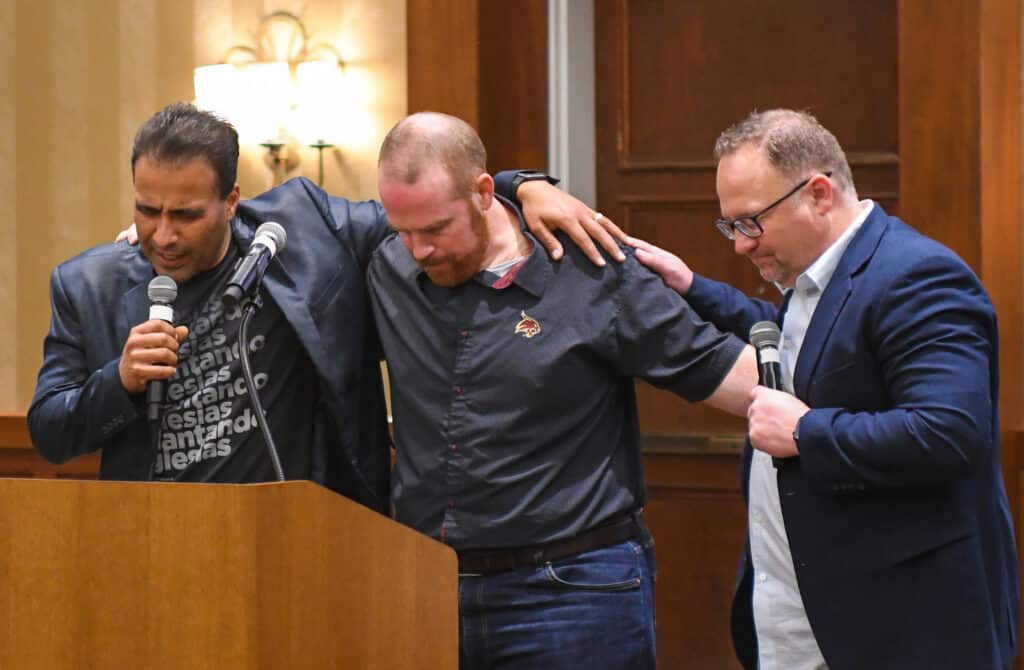As an American Baptist Christian (in that order) I experience the power of corporate bodies at every turn. My work is governed by over 2,300 churches, themselves congregationally governed, that send messengers to approve my budget and appoint my more direct authority structure, a board of trustees. The Grapevine police officer sitting in front of our building with a radar gun and a fast car is there at the behest of the thousands who live in his town. Endless, unavoidable road construction that surrounds every destination is provided by taxes paid by nearly everyone I know. Deliberations, debates, compromises, votes—world without end. Flawed as the process might be, no one has suggested a better idea. Many have tried far worse ideas. I try to be a fan of the best answer available to the various groups I reside within.
Maybe my headline is deceptive; there really isn’t a “but” to this. My enthusiasm for democratic processes does assume a few things about those processes, though.
Democracy depends on a vigorous congregation. In my church or in my nation, our deliberation is only sane if the deliberators are willing to do more than express uninformed opinions. A remarkable amount of source material is available to help those opinions be more informed. That means that you can actually ask or hear or read what a person said apart from the filter of another’s evaluation. You can read the Republican or Democrat platform or hear a presidential speech or ask the chairman of your church personnel committee for yourself so that you know not only the relevant questions but also an authoritative response. Perhaps the second part of that sanity is that those who are constitutionally qualified to vote and adequately informed should actually do so. I’m stunned at the number of my fellow citizen Christians who aren’t even registered to vote—that’s a sin. I’m also a bit disappointed at how few of my fellow church members participate in the significant decisions made in their names at church. Maybe that is a sin also.
Democracy depends on available information. Most conspiracy theories are silly. Sure, people can be evil enough to assassinate a famous person or blow up a skyscraper, but it is not reasonable to assume that thousands or even scores of conspirators will go to their graves without leaking the dirty truth. Come on, for most of us a secret known by two people is not safe. Famous conspiracies about the assassination of President Kennedy or the faking of the moon landing are absurd if only for the number of people required to keep secrets. It is also challenging to keep something under wraps when there are ambitious reporters sorting through your garbage. On the national political scene, we mostly do have access to information that tells the story. A bigger challenge is the volume of sometimes irrelevant information under which the story is buried.
But in our churches and in our denomination, those ambitious ferrets are not so much in evidence. Without making this the point of the column, I emphatically believe religious leaders of good will (employed and appointed) must be more open than is often the case, as their counterparts in the non-religious world are legally forced to be. It is natural to want to maintain the good reputation of an institution or church but that reputation needs to be the truth. No leader or plan is godly enough if its progress depends on no one finding out something that would result in a firing or ending of the project. Have an unassailable reason that you’re willing to explain for keeping secrets about work done in the name of the deliberative body you serve.
For God’s people, democracy depends on a population that walks with God. Have you ever been in a meeting where someone suggested that you take a couple of weeks to pray about something fairly mundane like carpet or yard work? I find that manipulative in many cases. It’s wrong for God’s people to show up at a meeting or voting booth if they have not been in fellowship with God. The result of that fellowship is that we will most often recognize the difference between better and worse solutions to most issues that arise within our body. Democracy for us depends on a relationship that gives us discernment beyond common sense. If we don’t have that resource, we’re just a political body like any other.
Democracy depends on God. That’s true of any variety of government applied to any body. Leaders are not independent of God even when they think they are. No advocacy group can do what prayer can do for a deliberative body. In every election we must ask for guidance and mercy from the only one who has perfect knowledge and power over human events. We should not spend more time watching debates or listening to news shows or reading voters’ guides than we do in prayer. The intervention of God is the only way that our church or nation will do the right things.
In a couple of weeks we’ll have a very important general election in America. Most elections are more important than we think but this one is a biggie. In a month or so your church will approve a ministry budget for 2013. Listen to the facts, listen to God, then show up and obey him. If God’s people will do that, it will affect our nation in a way beyond the four-year tenure of any president.














